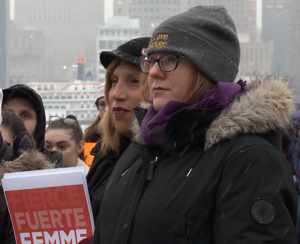Windsor and Detroit unite for Woman’s March

Women and men alike took to the streets of Windsor and Detroit for the Woman’s March on Jan, 17 2019
By Lauren O’Brien
Women and men united on both sides of the Detroit River last Thursday.
The Windsor Women’s March held a vigil in honour of women victims of violence. For the first time, the two border cities of Windsor and Detroit marched in sync, determined to cross international barriers and unite for women globally. Canadian participants met at the Great Canada Flag. After a short meeting, they marched to Festival Plaza.
Women’s March Global originated on Jan 21, 2017, the day after president Trump’s inauguration in the United States. Women and men alike took to the streets of Washington to protest the ideas coming out of the new government. Among them was Michelle Mainwaring, one of the organizers of the Windsor chapter of Women’s March Global.
Since then, the global movement has continued to evolve. Mainwaring said it is now about keeping women’s issues around the world in the forefront of people’s minds.
“We’re kind of transitioning from a women’s march to a women’s wave. There’s a lot of talk about walls and between Detroit and us tonight, there aren’t any. There are no walls between us and waves are stronger than walls,” Mainwaring said, “There’s this feeling of unity and knowing we are stronger together. The waves of women who are coming are making change and that’s what we have always done since the days of the suffragettes. You know, we fought for the right to vote and imagine if we hadn’t. Where would we be?”
For Christine Dilworth, an annual participant, the Women’s March is about supporting young girls everywhere.
“It’s important to recognize that I’ve had a very fortunate life and that’s not necessarily the case for all of the women in our community and certainly not all of the women globally. We join together to make sure our young girls feel supported and connected to the community,” said Dilworth, gesturing to her daughter as she spoke.
Dilworth held up a homemade sign with more than 12 names listed on the front, along with the outline of a dress. The names are those of missing and murdered Indigenous women. She considers this a major issue in our society.
“I think (the march) speaks for the fact that arbitrarily drawn borders are not enough to keep people apart and we stand with women and girls around the world.”


